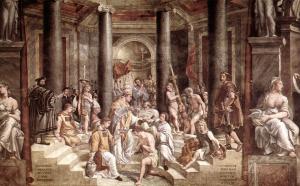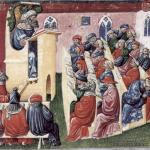 In the early years of the Christian faith, Christians found themselves in a rather unusual state of political being. On the one hand, many of them were Romans, but on the other hand, they often found that Rome was hostile to their very existence. As Romans, they had pride in the good they saw in Roman history, though they often felt Rome in their time had become corrupt and needed to be changed. They offered to support Rome as long as Rome asked them to do nothing which conflicted with their conscience, such as sacrificing to Caesar, joining in some belligerent military campaign, or joining in with the diabolic forms of entertainment centered around the Colosseum and its imitators. They wanted to be good citizens; they prayed for Rome and the common good, and did what they could to show their support for Rome and its people. On the other hand, they would not let that get in the way of doing what was right and just, and so they often were found standing in the way of Rome and its evil, which is how and why many Roman official came to hate Christians and called them criminals (using, as much as they could, the conspiracy theories and rumors which suggested Christians were morally lax, engaging in orgies, while they sacrificed children and ate them at their worship services).
In the early years of the Christian faith, Christians found themselves in a rather unusual state of political being. On the one hand, many of them were Romans, but on the other hand, they often found that Rome was hostile to their very existence. As Romans, they had pride in the good they saw in Roman history, though they often felt Rome in their time had become corrupt and needed to be changed. They offered to support Rome as long as Rome asked them to do nothing which conflicted with their conscience, such as sacrificing to Caesar, joining in some belligerent military campaign, or joining in with the diabolic forms of entertainment centered around the Colosseum and its imitators. They wanted to be good citizens; they prayed for Rome and the common good, and did what they could to show their support for Rome and its people. On the other hand, they would not let that get in the way of doing what was right and just, and so they often were found standing in the way of Rome and its evil, which is how and why many Roman official came to hate Christians and called them criminals (using, as much as they could, the conspiracy theories and rumors which suggested Christians were morally lax, engaging in orgies, while they sacrificed children and ate them at their worship services).
Despite the way Rome treated Christians, and the malice which spread about them, Christians wanted what was best for Rome. They promoted the common good, recognizing that the state had a place in its development. But they also recognized the state was not always achieving its purpose, and where the state neglected the common good, Christians came together and provided for each other – and others – what the state did not. This is how and why Christians were said to establish a “state within a state,” where Christians formed their own organization which established and accomplished goals which otherwise were done by states. They gave aid to the poor and needy; they helped educated the populace; indeed, they often worked for and gave free medical care to those in need.
Christians like Justin Martyr wrote to the emperors and other civic leaders, showing due respect and reverence, hoping to let them know what Christians stood for, and why letter Christians be free to live out their faith would be good for Rome instead of treating them as criminals who should be put to death. The state did not have to be seen as an enemy, though when it did evil, when it promoted evil, Christians would not agree with such actions, indeed, they must oppose such actions, even if it meant they had to sacrifice their lives. They did not take up armed revolt against the state. They did not think the state should not exist. They did not presume that Christians could and should do all that the state was expected to do. All of this was far from their mind, even when they opposed Rome and some of its worst ideals.
This means that, despite the way some act, the Christian response to the State is not one of complete opposition to the state; on the other hand, it must never be one of acquiescence to the state. It is one which recognizes that states have authority, that it should be respected, but also one which recognized the state needed to be transformed, to be made better, so it could fulfill its duty and support the common good. When the state ignores the common good, Christians must see that they are obligated to promote that good, doing it as they can, but also working for the state to be transformed so it will once again fulfill its essence and promote a just society.
Christians must support social justice. They must do it because they seek justice, and so they should be promoting it and engaging it even when the state does not, but they must also recognize justice is best when it is social and enforced by the state, so that they should work with the state and not apart from it, seeking to make sure the state engages social justice as well. There is no place in Christian thought which suggests that the state can ignore the common good because of Christian charity, nor that Christians can ignore the common good and working with the state because of their acts of charity. No. Christians are incarnational in belief, and social in being, following the principles God gave to them in Scripture and tradition. This is why Christians, long before Constantine, were writing to officials, seeking to work with the state, explaining how and why Christians can do so, hoping to transform the state by such cooperation with it, likewise why, after Constantine, many of the public works established by the church was taken over by the state without complaint from the church. The church knew that they were best managed by the state and supplemented by the church.
Many have suggested that the church was taken in by Constantine, as the transformation of the state was incomplete. There certainly are good arguments for this. It is not because Constantine himself should be seen as some sort of deceitful politician, but rather, he was a convert himself, and with him, the state underwent a transformation, and with such transformations, many things can and do go wrong. There is no utopia on earth. But when there is the chance for Christians to work with the state, to promote the common good in and with the state, Christians need to do this whenever possible. However, they are also not expected to turn everything over to the state, expecting the state can and will do everything. Christians must always be civic minded, but they must also remain true to themselves, promoting the common good which the state has not yet engaged while fighting the state whenever it promotes grave injustices, whether or not those injustice affect Christians or not. That is, Christians are not to become complacent and expect everything to be done by the state, nor, on the other hand, are they to become totally independent from the state, thinking the state is superfluous. The state should work for the common good, and because of this, Christians must work with the state because they, too, must work for the common good: but Christians should also look for ever greater justice, promoting it, working to transform and reform the state even as they seek to transform and reform their lives on a daily basis. Where the state fails, Christians must take over and fight for justice: they can’t wait for the state to be transformed, but when the state takes in and accept some aspect of the common good, Christians then must work with the state and yet continue to work for that same good themselves, making such justice greater in the process. This is why Christian charity should never be set against the state, as if they two cannot and should not co-exist: as grace perfects nature, as salt preserves what has been salted, so Christians are to be the salt of the earth, sharing their grace even to the state, helping to elevate it that much more while preserving the good which the state has attained.
This, then, should be kept in mind as Americans reflect upon the election results of 2018. No one is going to be entirely happy with the results. No one should be happy with the results. But now that the election is over, Christians are especially called once again to fulfill their duty and to be the salt of the earth. They are called once again to work with the state, to promote its transformation to something better, calling it to act in justice and for the common good, opposing the state when this does not happen, even as they are to continue to create projects of their own which work for the common good. They are to continue to make their voice heard. They need to imitate St Justin Martyr, writing to officials, demanding justice for the oppressed. They need to speak out and resist when the state continues to denigrate human life, such as is happening at the border when migrants are being demonized and threatened because they seek to live a better life.
Civil disobedience is a fundamental part of Christian history not because Christians reject the state, but because they recognize its relative value. Civil disobedience, likewise, points out that our duty to the common good does not end on election day. Elections are a part of the process, but if we want the right candidates to run for office, as well as for leaders who are in office to change, we must do more than sit back and watch the affairs of state go by before us until the next election cycle begins. We must be active, engaging the issues at hand. We must be active in our local community, but also, we must be active beyond that, recognizing the interdependent relationship that all local communities have with one another, and what evil befalls one can and will befall others. We must stand up and do what is right, forcing the government to change its course when it sways away from the common good and promotes injustice. We must, likewise, stand up and work with the government when and where it promotes the common good, helping it execute its proper function so that it becomes that much harder for injustice to slip in and dismantle the elements of the common good which has already been accepted. We must, likewise, be prudent in our actions, recognizing what we can do at a particular time and place, and what we cannot do, even as we must recognize what are the gravest, most immediate dangers against the common good which lie before us and work to fix them first and foremost, lest we get distracted, win some minor battles and lose the war.
The election is over. Some battles are now finished. But the war continues. Let us continue to fight for what is right and not become complacent as our lives seemingly return to normal.
[IMG=Baptism of Constantine by School of Raphael [Public domain], via Wikimedia Commons]
Stay in touch! Like A Little Bit of Nothing on Facebook













